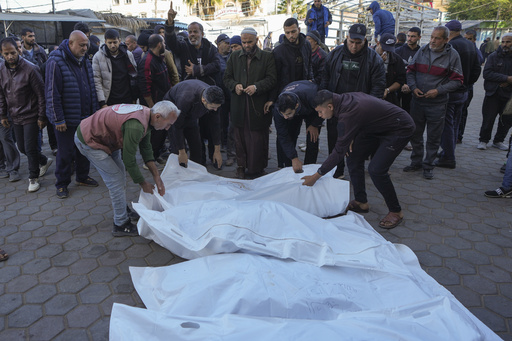
TEL AVIV, Israel — A rocket launched from Yemen struck an area near Tel Aviv overnight, resulting in minor injuries for 16 individuals due to shattered glass, according to reports from the Israeli military on Saturday. This incident occurred just days after Israeli airstrikes targeted Houthi rebels, who had been firing missiles in solidarity with Palestinians.
Additionally, 14 people suffered minor injuries while seeking shelter as air raid sirens blared just before the missile made impact around 4 a.m. Saturday. The Houthi rebels claimed via a statement on the Telegram messaging platform that they had targeted a military installation with their hypersonic ballistic missile, although they did not specify which site they had aimed at.
The recent attack follows a series of Israeli airstrikes on the Houthi-controlled capital of Sanaa and the port city of Hodeida, which reportedly resulted in at least nine fatalities. These Israeli actions were prompted by a prior Houthi missile strike that hit an Israeli school building. The Houthis also asserted they conducted a drone attack aimed at a military target in central Israel on Thursday.
The Israeli military asserts that the Iran-aligned Houthis have launched over 200 missiles and drones amid the ongoing Israel-Hamas conflict in Gaza. Furthermore, the Houthis have been targeting maritime activities in the Red Sea and Gulf of Aden, declaring that they will continue their offensive until a ceasefire is established in Gaza.
According to a United Nations spokesperson, Stephane Dujarric, the recent Israeli strikes resulted in significant damage to Houthi-controlled ports along the Red Sea, which could substantially reduce their operational capacity. These ports play a crucial role in the food supply chain to Yemen, particularly amid the country’s protracted civil war.
U.N. Secretary-General Antonio Guterres expressed concerns that the mutual attacks could escalate tensions in the region and hinder ongoing U.N. mediation efforts.
In another development, the situation in the Gaza Strip saw mourners attending the funerals of 19 individuals—12 of whom were children—who lost their lives due to Israeli airstrikes on Friday and overnight. One particular strike targeted a residential building within the Nuseirat refugee camp, resulting in the deaths of at least seven Palestinians, including five children and a woman, with 16 others injured, according to health officials.
In Gaza City, another airstrike killed 12 people—seven children and two women—based on reports from Al-Ahli Hospital, where the bodies were taken. As mourners convened at the hospital, emotional scenes unfolded with women providing comfort to one another, and a man solemnly carried a tiny body wrapped in a shroud during the procession.
According to Gaza’s Health Ministry, 21 individuals were reported killed and 61 wounded within the last 24-hour period. Israel faces intense international scrutiny regarding the significant civilian casualties in Gaza, with critics questioning whether adequate measures are being taken to mitigate them. While Israel maintains that its strikes are directed solely at militants, it attributes civilian casualties to Hamas, stating that their operatives frequently operate within residential zones.
Since the outbreak of violence in October 2023, following a Hamas assault that claimed around 1,200 Israeli lives, over 45,200 deaths and more than 107,500 injuries have been reported in the Gaza Strip. Local health officials indicate that over half of the casualties are women and children, without distinguishing between combatants and civilians.
Meanwhile, the Israeli military has reported that a humanitarian operation facilitated the distribution of thousands of food packages, sacks of flour, and water to the Beit Hanoun area in northern Gaza. The military stated that the U.N. World Food Program coordinated the delivery of 2,000 food packages, 1,680 flour sacks, and thousands of liters of water.
However, aid organizations have previously highlighted significant challenges due to military operations and armed factions impeding their capacity to assist civilians in need.
On a related note, Gaza’s Health Ministry issued an urgent plea for medical and food supplies to support the Kamal Adwan Hospital in Beit Lahia. The hospital director described increasingly dire circumstances, emphasizing the ongoing gunfire and shelling nearby that have raised alarms among patients.
Dr. Husam Abu Safiyeh, the hospital’s director, reported severe shortages in vital resources. He indicated that despite appeals for assistance, promises for supplies to maintain essential services such as electricity, water, and oxygen remain largely unfulfilled. Although the World Health Organization managed to send 70 units of blood, the hospital urgently needs at least 200 units to address its critical requirements. Presently, 72 injured patients are being treated there.
Accessibility to food has also become a pressing issue, with the hospital unable to provide meals for those in need. The staff is working tirelessly, yet basic provisions for both patients and caregivers are lacking.
Overall, the humanitarian crisis continues to escalate as the conflict unfolds, with an urgent call for assistance echoed from various sectors amidst the ongoing violence.
